#lāčplēša diena
Text
happy lāčplēsis' day to the latvian folks

17 notes
·
View notes
Text
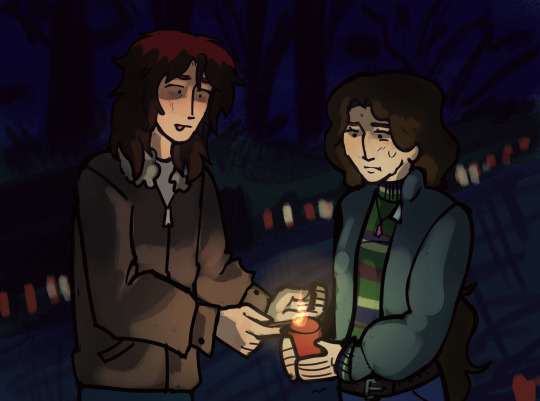
Lāčplēša diena 14. novembrī. Ļoti loģiski
5 notes
·
View notes
Text
Par lāča plēšanu
Daudziem Lāčplēša diena aprobežojas ar svecīšu nolikšanu, kaut arī tai ir dziļa jēga, kas plēšās pāri emocijām un jūtām. Vienmēr var uzdot jautājumu, vai pašlaik Latvija ir tā valsts, par kuru cīnījas un atdeva dzīvību tā laika karavīri. Īsi par Lāčplēša dienu kopsakarā ar tagadējiem notikumiem.
Revolūciju organizē romantiķi, bet pabeidz korumpēti ierēdņi, veiksmīgi tiekot galā ar pirmajiem.…

View On WordPress
0 notes
Text
Lāčplēša diena
Am 11. November wird in Lettland „Lāčplēša diena“ begangen. Dies ist ein Gedenktag für die Soldaten Lettlands, die für die Unabhängigkeit Lettlands gegen Russland 1919 in Riga gekämpft haben.


Anlässlich des Gedenktages wurden verschiedene Feierlichkeiten in Riga organisiert. Ich bin mit ein paar Freunden in der Stadt unterwegs gewesen. Wir haben verschiedene Konzerte besucht und die Stadt wurde von Kerzen und Fackeln hell erleuchtet. Unter anderem wurde auch ein brennendes Floß über die Daugava als Erinnerungszeichen gezogen. Wer einmal ein wenig lettischen Rock hören möchte, dem kann ich die Rockband „Līvi“ empfehlen. Die Band hat vor allem während der Sowjetischen Besatzungszeit für lettischen Patriotismus und Anti-Sowjetismus polarisiert.
Der Rest des Abends war dann eine spontane Verkettung der Ereignisse bis zum nächsten Morgen..


0 notes
Photo
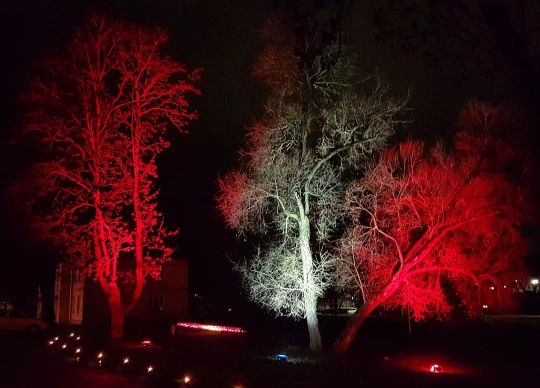
11 ноября в Латвии- день Лачплесиса (Lāčplēša diena) — день памяти героев, павших за освобождение Латвии. * #деньлачплесиса #lāčplēšadiena #цветфлага #Латвия #Latvija #Salaspils #Саласпилс #11ноября (at Kultūras nams Rīgava) https://www.instagram.com/p/Ck1GOegMbJ-/?igshid=NGJjMDIxMWI=
0 notes
Photo

11. novembris. Lāčplēša diena - visu Latvijas zemes drosmīgo brīvības cīnītāju piemiņas diena.
Per aspera ad astra L. - Caur ērkšķiem uz zvaigznēm.
-----
November 11. Lāčplēsis Day - all heroic Latvia land freedom fighters memorial day.
Per aspera ad astra L. - Through thorns to the stars.
-----
#Latvija #Latvia #Europe #EU #European #Culture #Human #Values #Nature #Earth #Sustainability #Peace #Future #Past #Present #Family #Home #Homeland #Land #Noble #Nobleman #Sacrifice #Heroic #Honor #Hero #War #Army #Soldier #Duty #History
1 note
·
View note
Text
youtube
1 note
·
View note
Photo
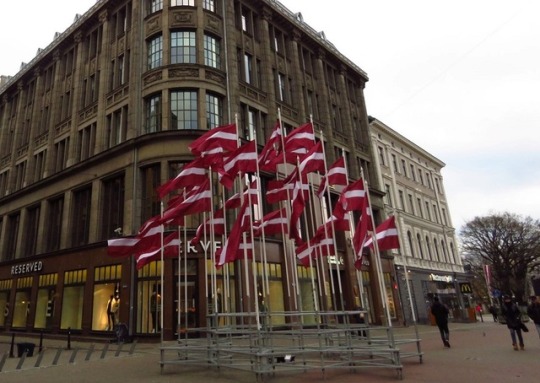
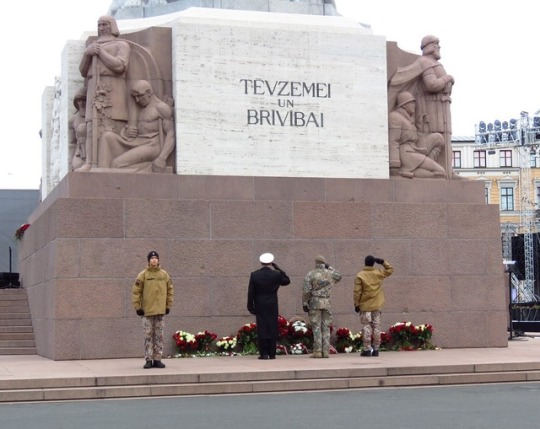


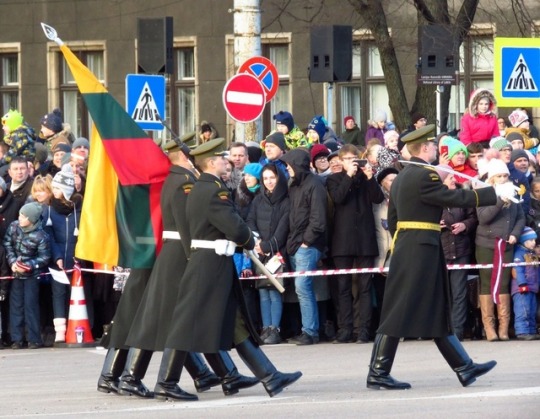
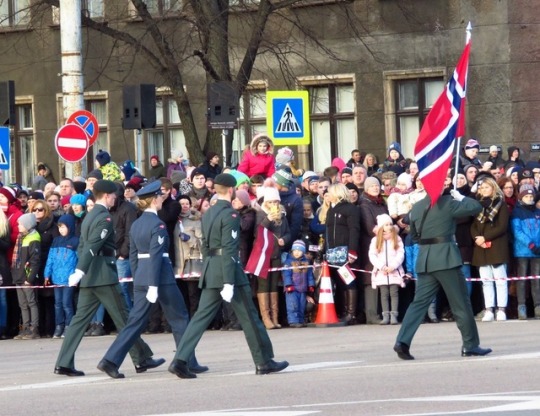

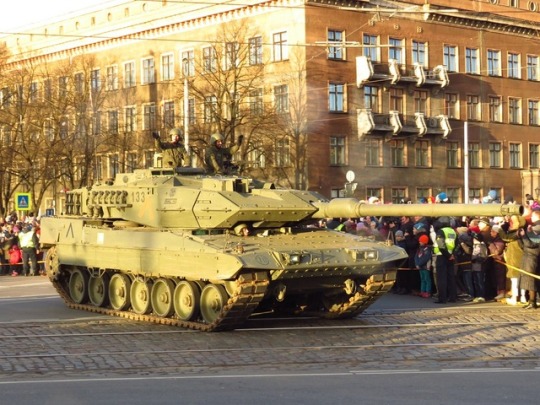
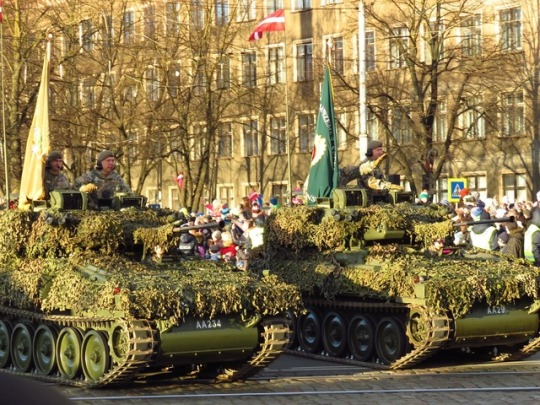
Lāčplēsis Day memorializes the soldiers who fought for Latvian independence in 1919 and is celebrated on 11 November, the date of a decisive battle. All photos by D.
1. A display of Latvian flags before the ceremonies in Riga, the capital city.
2. The day started with a wreath-laying ceremony at the Freedom Monument, with the presidents of Estonia, Finland, Latvia, and Iceland participating.
3. Next was the Latvian National Armed Forces Parade with a contingent from most every NATO state...
4 & 5. ...Followed by a display of Latvian military units and vehicles.
The day ended with a spectacular fireworks show seen here.
3 notes
·
View notes
Text
patriotisms. migranta perspektīva.
nesen pārvācos uz Berlīni. tagad liekas, ka pa īstam un pavisam. jā, šeit ir labāk nekā Dzimtenē. kaut kādā ziņā mani tas skumdina, bet šo pāris mēnešu laikā es esmu atklājis daudz lietu, kuras viennozīmīgi apliecina šo vispārinājumu pietiekamā mērā, lai beidzot par to uzrakstītu.
cik man zināms, es esmu dzimis Rīgā. mani nekad nav interesējusi dzīve ārpusē. ar to es domāju dzīvi laukos (aka jebkas, kas ir ārpus Rīgas, manā izpratnē organiski iekļaujas šajā kategorijā; protams, ir runa par Latvijas teriotoriju). tāpat arī iniciatīva uzzināt par Latviju vairāk, braukājot pa nekurienes mežiem, izliekoties, ka esmu aizrauts ar latviešu literatūras / mākslas / citu nācijai nozīmīgu cilvēku dzimto mazpilsētu / sēņu / purvu izpēti, man nekad nav piemitusi. mani tas vienkārši nesaista, un pamatskolas forsētās ekskursijas ar šādu uzstādījumu manā atmiņā palikušas ar citiem daudz spilgtākiem piedzīvojumiem autobusā.
kādu laiku man likās, ka Rīga ir pilsēta, bet es, šķiet, esmu maldījies. pirmo reizi par šo aizdomājos toreiz īsi pēc tam, kad Saeimai (pelnīti) tika izsisti logi. tas bija jautrās un reibinošās nekustamo īpašumu / viegli iegūstamās naudas ēras beigas. sabiedriskās un “kultūras” vides dinamikā iestājās pamatīgs lūzums, kuram cēlonis, manuprāt, bija rīdzinieku pastiprināta migrācija uz Rietumeiropu un Latvijas lauku iedzīvotāju ievākšanās Rīgā.
to visu pastiprināja valsts menedžmenta “augstākā pilotāža”, pa galvu pa kaklu risinot ielaistās problēmas, kuru sekas, pateicoties mūsu visdaiļāk dirsošajiem speķa pīrādziņiem, bija katastrofālas.
es toreiz kļūdījos. nē, es nebiju tas, kurš, izmantojot situāciju, pizģīja šmigu Latvijas Balzama veikalā vai arī, revolucionārā gara apstulbināts, pielika roku policijas busiņa apgāšanā. es neaizbraucu. aizbrauca citi. aizbrauca dahuja. aizbrauca arī vairāki mani draugi un paziņas. retrospektīvi vērtējot, iesmesli tam bija vairāki, bet, man liekas, pārsvarā tie sakņojās slimīgā optimismā, kam sekoja fundamentāla vilšanās un tam sekojošā paralizējošā depresija.
man likās, ka tas ir pārējoši - galu galā nevar taču būt tā, ka pelmeņi, salddirsēji un idioti ir atslēgas pozīcijās visu laiku. kļūdījos - var. izrādās, ka pat tik mazas ekonomikas rekonstruēšana prasa daudz vairāk nekā ekseļu tabulas, nepārejošas filosofiskas mokas par kvalificēta darba spēka aizplūšanu un copy-paste tekstu upes māsterplānu sējumu krastos.
altruisitskais un pretrunīgais uzstādījums, ka nauda jau nav galvenais, ir tas, ko sākumā nesapratu arī es. nauda ir forši, bet vēl foršāk par naudu ir cerība un iespēja pilnvērtīgi piedalīties. šeit ir runa par cerību dzīvot mūsdienīgā, pragmatiskā sabiedrībā ar iespēju piedalīties sev saistošā veidā. lai arī situācija sāk šķietami lēni (pārāk lēni) uzlaboties, jāatzīst, ka manu interesi par atgriešanos tas īpaši neietekmē, jo es redzu, ka problēma ir daudz dziļāka nekā “valdība”, “krievi”, “Ušakovs”, “nodokļu sistēma” vai ____________ (ievadi savu populārāko žēlabterminu šeit).
problēma ir mūsu vergu mentalitāte, divkosība, slinkums un nespēja uzņemties atbildību par savu rīcību (kā arī konstruktīvā formā prasīt šo atbildību no citiem). nevēlos nekādā veidā sevi izdalīt ārpus grupas, kam piemīt šīs īpašības un ko vienā vārdā es sauktu par latviešiem. diemžēl mūsu izpratne par nacionālo ideju ir aizķērusies 19. gadsimtā. vienīgais, uz kā dotajā brīdī tā balstās, ir savdabīgs pretpozicionējums mūsu visai psihajam kaimiņam Austrumos (labākajā gadījumā). man šķiet, ka mēs sevi novērtējam pārāk zemu. mums pietiek vien ar to, ka kāds deguna galā noplivina sarkanbaltsarkanu lupatu, un mēs sākam runāt ieprogrammētās frāzēs, dziedāt pārklausītas, pārnodrāztas dziesmas un nespēt racionāli uztvert informāciju. skaidrs, ka mainīt šo ir daudz grūtāk nekā “atlajst sajmu”, bet es šobrīd neredzu pietiekami nopietnu vēlmi tiešām šādu maiņu aizsākt.
to visu papildinot to ar kritisku situāciju izglītības jomā un graujošo hronisko nabadzību, kas šajā gadījumā ir gan problēmas cēlonis, gan sekas, mēs iegūstam visai pelēku un ne visai cerīgu ainu, kas rezultējas tajā apātijā un pohujismā, kas ir Rīgas ikdiena.
nav brīnums, ka aprakstītajā situācijā kā eļļa ugunī strādā Latvijā tik nepopulāra ideja kā migrācija. nezinu gan, kāpēc publiski neesmu redzējis iztirzājumus pretnostatījumam par tēmu: mēs - latvieši citur braukt “laimi meklēt” drīkstam, bet pie mums iebraucēji nav vēlami, ja vien, protams, viņi nav turīgi baltādainie ar augstu profesionālo kvalifikāciju, kuri perfekti runā latviski, sīki un smalki pārzina mūsu valsts ģeogrāfiskās un vēsturiskās nianses, ir sajūsmā par mūsu “sasniegumiem” pasīvajā ekoloģijā, ienīst Putinu un labākajā gadījumā nāk no ASV, Vācijas, Skandināvijas, Lielbritānijas, bet nekādā gadījumā nav atbraukuši “atņemt mums mūsu meitenes”, kuras, protams, ir visskaistākās pasaulē. ja šī nav divkosība, es nezinu tad, kas tā tāda ir.
augstāk minētajā Ingas Spriņģes (visu cieņu žurnālistei par viņas tiešām nozīmīgo darbu) aktuālajā, bet visnotaļ patosīgajā, anāli dizainiski noformētajā materiālā (lielisks piemērs jau minētajam pohujismam darbībā, starp citu) kā odziņa tam visam pa virsu ir tas absolūtais sūds, ko bīda Nacionālā Apvienība. citēju: “Visskaļāk “pret viesstrādniekiem, par dzimstību” iestājusies Nacionālā apvienība, bet pat tās valdes loceklis Jānis Iesalnieks atzīst, ka darbaspēka trūkumu ar dzimstību neatrisināt, jo ir pārāk maz sieviešu bērnu radīšanas vecumā. Tāpēc NA cer uz robotizāciju un tikai augsti kvalificēta darbaspēka ieviešanu, turklāt daudz mazākā apjomā kā ieplānojusi EM.” varētu padomāt, ka robotizācija jau nav notikusi, un tie nav roboti, kuri strādā valsts institūcijās… bet ja nopietni, - lai arī apzinos, ka tuvākajā laikā darba tirgū notiks kodolsprādziens ar nosaukumu “automatizācija”, mani šī daiļdiršana patiesi fascinē. teorētski šis ir pareizs un jēdzīgs arguments, tomēr es gribu redzēt, cik veiksmīgi Latvijas apstākļos norisināsies “robotizācija”, kas faktiski nozīmētu to, ka lielākā daļa valsts pārvāldē strādājošo zaudētu darbu. (nu nav nepieciešams ražot papīru kalnus vienā kabinetā, lai pēc tam tos aiznestu uz citu un “ievadītu sistēmā”, lai ko tas arī nozīmētu.) un viņi nebūs vienīgie...
patriotisma jēdzienam šajā kontekstā nepieciešama pamatīga revīzija. šobrīd visa pasaule piedzīvo visai straujas pārmaiņas, un migrācija tajā spēlē nozīmīgu lomu. bailes no tās ir tas, ko izmanto skaļākie bļāvēji, 12. līmeņa patiesības burvji, cilvēki dīvainās cepurēs un gluži vienkārši - ultrabagāti noziedznieki, interpretējot to visparedzamākajā, klišejiskākajā un zemiskākajā veidā, lai pagarinātu savu dzimumlocekli (burtiskā un pārnestā nozīmē). ir vietas / valstis, kur tas izpaužas spilgtāk, bet mums kā pārejas demokrātiju piredzējušajiem ir cerība, ka ir iespēja nepieļaut šāda idiotisma dominanci. jā, mums, nevis kādam citam. jā, mums ir iespēja dzīvot daudz labāk, un, nē, migrācija, krievvalodīgie, bedres uz Krišjāņa Barona ielas, ziema tam nav nekāds šķērslis. mēs varam sasniegt daudz vairāk, ja risināsim pareizās nevis imaginārās problēmas, ja vairāk domāsim un darīsim, nevis nodarbosimies ar huiņu, ierobežojot un aizliedzot. mēs vienkārši varam būt labāki gan katrs atsevišķi, gan kopā.
1 note
·
View note
Note
I'm great! Today' is Polish Independence Day, so I didn't have school! Also got this art I requested a few days ago and it looks amazing!
I really Hope that you'll be able to fix your sleep schedule 💜
Oohh! That's cool!
Actually today is an important day in Latvia too - Lāčplēša diena [la:chplesha diəna], a memorial day for solders who fought for independence of Latvia. ヾ(•°ω°•)/ But anyway we had a physics test. :c
The art is cute 🌺🌸🌺🌸🌺
I hope so too.
14 notes
·
View notes
Photo

Almost full Moon is rising above Riga Castle during celebration of the Lāčplēsis Day, Latvia, November 11, 2019. Photo by D.P.
The Lāčplēsis Day (Latvian: Lāčplēša diena) is a memorial day for soldiers who fought for the independence of Latvia. It is celebrated on November 11, marking the Latvian victory over the West Russian Volunteer Army – a joint Russian-German volunteer force led by the warlord, Colonel Pavel Bermondt-Avalov at Riga during the Latvian War of Independence in 1919. People commemorating the fallen by placing candles at the wall of Riga Castle.
#Latvia#Riga#Riga Castle#Latvian War of Independence#the Lāčplēsis Day#celebration#original photography on tumblr#street photography#European history#Northern Europe#Moon
10 notes
·
View notes
Text
Lāčplēša diena
Today we celebrated Lāčplēša diena in Latvia. First I went to a really great concert in the culture center in my city. Afterwards I joined the torch walk. It was really great and interesting for me to experience this kind of tradition.





1 note
·
View note
Photo

We salute LATVIA today on Lāčplēsis day! We salute freedom fighters who gave their lives for our Freedom! May we be united and strong together as our forefathers! God bless Latvia! 🇱🇻 * Lāčplēsis Day (Lāčplēša Diena) is a memorial day for soldiers who fought for the independence of Latvia. It is celebrated on November 11 marking the victory over the West Russian Volunteer Army – a joint Russian-German volunteer force led by the warlord Pavel Bermondt-Avalov– at the Battle of Riga in 1919 during the Latvian War of Independence. A popular Lāčplēsis Day tradition since 1988 is placing candles on and by the wall of Riga Castle, visiting Brāļu kapi ( The Brothers cemetery) and other places of significance to commemorate events. The name of the memorial day comes from the protagonist of the Latvian national epic, our hero - Lāčplēsis (vintage illustration from rare magazine in this photo) 🇱🇻 Thanks 📷 @santa_bro for this gorgeous find! 💖 P.s Lāčplēsis means Bearslayer and embodies justice, protecting the weak and standing up against dark forces. Look up stories about him, you’ll be impressed !
3 notes
·
View notes
Text





Lāčplēša diena - visu Latvijas zemes drosmīgo brīvības cīnītāju piemiņas diena.
Per aspera ad astra L. - Caur ērkšķiem uz zvaigznēm.
-----
Lāčplēsis Day - all heroic Latvia land freedom fighters memorial day.
Per aspera ad astra L. - Through thorns to the stars.
-----
#Latvija #Latvia #Europe #EU #European #Culture #Human #Values #Nature #Earth #Sustainability #Ecology #Future #Past #Present #Family #Home #Homeland #Land #Noble #Nobleman #Sacrifice #Heroic #Honor #Hero #War #Army #Soldier #Duty #History
6 notes
·
View notes
Text
Rīga City Elections: 2017

With headlines dominated by major elections in the UK, US, and France in the past year and another major British vote just a month away, you might be surprised to hear that Latvia also underwent a significant vote as well on Saturday. Although national parliamentary elections are still a year away, voters throughout the cities and counties of Latvia spent Thursday, Friday, and Saturday choosing their local officials. While city (and county) elections don't nearly get the same attention or excitement that federal and state elections do in the US, Rīga makes up somewhere between a half to a third of the entire country's population. While mayoralty of a major city is often a stepping stone to higher office in the US, the mayor of Rīga is a national political figure without parallel in the states (aside from possibly New York).
The city council's system is similar to Latvia's national proportional voting parliamentary system. Voters throughout the city choose one “party” to vote for, and parties get a number of representatives on the council proportionate to the amount of overall votes they got throughout the city. Unlike in American cities, there are no “wards” or “districts” that vote independently of one another. There is no councillor from Bolderāja, for example; all members are “at large.” The threshold for representation on the council is 5%, so as you can see below only three parties held seats after the 2013 election even though twelve parties competed overall.

This means that voters do not directly elect their mayor. The position of “mērs” works similar to that of “prime minister” in parliamentary systems, and whichever party or coalition of parties is able to hold a majority of seats and form a government gets to choose the mayor. In practice, this means that the leader of the winning party during the election becomes “mayor.”
Of course, just because mayors are not technically directly elected does not mean that individual personalities don't have an effect on the election. In fact, Latvian politics are quite personality-driven, with party advertisements and promotional materials often prominently featuring their would-be mayors.
Although technically eleven parties took part in the election, only the six that are described here were competitive in any way shape or form. Having only lived here for four years and only now reaching a level of Latvian competence required to watch and understand news programs and articles, I can't and won't claim to be an expert on Latvian politics. Instead, this post will mostly be my casual observations as a semi-outsider.
1. Saskaņa/Gods Kalpot Rīgai! (Harmony/An Honor to Serve Riga!)

We start with the incumbent coalition that has governed Rīga for the past eight years and was the odds-on favorite to win the election. Saskaņa is a continuation of the “Sakaņas centrs” coalition which originally formed in 2005 as an alliance between various “social democracy” parties and regional factions that generally represented the interests of the country's Russophone minority. Going into this election, Saskaņa was the largest single party not just on Rīga city council but also in Saema (the country's parliament).
Saskaņa is routinely accused of being a front for the Kremlin's interests in Latvia, as the party supports closer ties with Russia as well as issues important to the Russian minority such as official second language status and unconditional citizenship for the more than 11% of the country's “non-citizen” residents (most of which are ethnically Russian and migrated during Soviet times). Reports and investigations regarding Saskaņa's connections with Russian government money and influence are a regular occurrence in Latvian media, although like most of the Kremlin's alleged meddling attempts, it's been virtually impossible to prove anything of significance.
The party's national leader and incumbent mayor is the legendary Nils Ušakovs, who first came to office in 2009 at the age of just 32. In the decade before he became mayor, Ušakovs was an active and well-known journalist who worked for a wide range of Latvian media outlets. Having been married three times, his colorful personal life is a constant fixation of Latvian tabloids. You may have already seen him in a viral video that made the international rounds a few months back in which his interview was interrupted by one of his cats jumping onto the table and drinking from his coffee mug.
youtube
Ušakovs is one of the few public figures in Latvian politics that inspires the same sort of vitriol or devotion that personalities such as Barack Obama or Donald Trump do in America. While I rarely hear anything but apathy regarding Prime Minister Māris Kučinskis, people generally think that the mayor is either an honest and competent public servant whose done the best for Rīga that the can, or a cynical and insidious mouthpiece of Russian government interests.

For the past two elections, Saskaņa has run on a unified ballot with the small regional party “Gods Kalpot Rīgai!” This party was founded by anti-corruption activist Andris Ameriks after his former “Reform Party” that previously ran city government in coalition with Saskaņa dissolved due to an ironic massive corruption scandal. As is expected by an incumbent party, much of the advertising and promotional materials throughout the city focused on getting out the vote and “not staying home.” It seems like Saskaņa seemed particularly interested in shedding it's image as the “Russian party,” as some of its advertisements featured supporters with clearly “Latvian” names extolling Ušakovs' supposed achievements in improving city life over the last few years.

Although the other major parties didn't particularly coordinate with one another, there was a general effort to paint the election as a referendum on Mayor Ušakovs, who they saw as vulnerable after eight years of incumbency and lower approval ratings than ever before.
2. Latvijas Reģionu Apvienība/Latvijas Attīstībai (Latvia's Regional Alliance/For Latvia's Development)

After incumbent Sasķana/GKR, the party that seemed to compete the most for Rīga city council was the new Latvijas Reģionu Apvienība, a party formed in 2014 as an alliance of various regional parties just a few months before the national parliamentary elections. The party advertises itself as “centrist” an pro-European, with a focus on developing regions outside of Rīga. Like virtually all major Latvian political parties, “family values” (marriage between only a man and a woman) is one of the “core values” listed on the “program” page of their website.
The party's leader since its founding in 2014 has been Mārtiņš Bondars, a veteran in Latvian politics as well as a former NCAA basketball player and president of the infamous Latvijas Krājbanka during the 2008 financial crisis. Bondars' image featured heavily in LRA campaign advertising, going by the quite optimistic name “Mērs Bondars.” Līga and I joked that he was so confident about winning the election that he legally changed his first name to “Mērs.”

In Rīga the party shared a ballot with Latvijas Attīstībai, Latvia's version of a libertarian party. Despite it's youth, LRA had already had some early success in the 2014 parliamentary elections with 6.66% of the vote and winning eight seats in Saema.
3. Vienotība (Unity)

Oh, how the mighty have fallen. When I first arrived in Latvia, Vienotība was the major player in national politics, and since then has been the largest governing coalition partner (Saskaņa has been the biggest single party in Saema, but has never been able to form a government due to other parties refusing to cooperate with them). Since then, due to a series of mis-steps and PR disasters, their reputation as a technocratic centrist party has been replaced by one of incompetence and inefficiency. Vienotība seems aware of this, and has gone through various attempts at re-branding lately. In case you weren't able to guess, “jaunā” means “the new” in Latvian.

For Rīga's elections, the party put up 36-year-old Vilņis Ķirsis and featured his picture heavily in advertisements throughout the city along with various campaign promises such as “4000 new rentable apartments for young families.” However, the material I got from “Jaunā” Vienotība in the mail a few days before the election painted a very different picture.

Nasty negative advertising is nothing new in politics anywhere in the world, but this pamphlet had me baffled. The very first comparison between “Mērs” Ķirsis and Mayor Ušakovs is that while Ķirsis supports Latvian as the only state language, Ušakovs supports Russian as a second official state language. These opinions should surprise virtually no one, but it was strange to see this as the very first issue that Vienotība wanted to highlight considering that roughly half of the population of Rīga is either ethnically Russian or Russophone, and around the same proportion supported a proposed constitutional amendment in 2012 that would have changed the language policy. Even more shocking is the very third point that highlighted how Ķirsis celebrates the patriotic holiday of Lāčplēša diena every year (the day that the Latvian army successfully held off an invading force of Germans and Russians in 1919), while Ušakovs celebrates the Soviet victory over Nazi Germany on May 9th each year. The issue of May 9th celebrations is one of the most emotionally raw for ethnic Latvians and Russians who see the day through two radically different perspectives, and drawing attention to it on a pamphlet sent around a city almost evenly divided between both ethnicities is a curious decision for a party whose name means “unity” in English.
This pamphlet seemed to me like somewhat of a white flag for this particular election, and I imagine that the party is looking forward instead to parliamentary elections next year. Even so, it's strange to me that a party that built its reputation on centrism and technocracy would dive so enthusiastically head-first into identity politics and have no problem completely alienating a large swath of the electorate. Is this what's “jaunā” about Vienotība? The lifecycle of the average Latvian political party is notoriously short, and Vienotība seems like it's just about ready to go to seed.
4. Nacionālā apvienība "Visu Latvijai!"—"Tēvzemei un Brīvībai/Latvijas Nacionālās Neatkarības Kustība" (National Alliance “All for Latvia!” — ”For Fatherland and Freedom/Latvian Independence Movement”)

Yes, this is actually the party's name that appears on the official ballot, although it sounds long and convoluted enough to be the title of a Japanese anime OVM (direct-to-video movie). The party's platform is a mix of far-right populism, social conservatism, environmentalism, and patriotism that appeals to a lot of nationalists. As you can tell from the long name, many smaller similar parties have been absorbed into what is most commonly called “Nacionālā Apvienība” (or, when written, “NA”). NA these days has a virtual monopoly on Latvian nationalist politics; an rival upstart party called “No sirds Latvijai” (For Latvia from the Heart) has failed to take off despite an impressive seven seats in Saema won in their first national election (2014), and is likely dead in the water after their candidate in the second largest city of Daugavpils released this infamous “rap” video:
youtube
Before the parties that represented the Russian minority successfully consolidated into Saskaņa, NA's component parties controlled Rīga's mayoralty for much of the 90s and 2000s. These days NA seems content being a bit player in Latvian politics, having participated as a minor partner in the last few national coalition governments. Interestingly, mayoral candidate Baiba Broka is good friends with her nemesis Mayor Ušakovs' current wife (as you can see in this trashy tabloid photo of the couple attending her birthday featured in Latvia's version of the National Enquirer, kasjauns.lv).

5. Zaļo un Zemnieku Savienība (Union of Greens and Farmers)

Although ZZS currently controls the prime ministership and presidency of the country as well as many key ministerial positions thanks to an impressive 21 seats in Saema (opposed to Vienotība's 23), the party has never quite taken off in Rīga. This can be evidenced by the fact that although I received a newspaper in the mail printed by the party to introduce their candidates and platform, I didn't see a single poster anywhere in the city during the entire campaign. The party failed to qualify with more than 5% of the vote in the 2013 elections, and it didn't seem like they were expecting to do much better this time around.
While technically a member of the Europe-wide Green Party, ZZS describes itself as “center-right” which is odd for green politics to say the least. Since 2006, the party has been dominated by notorious oligarch and mayor of the 6th largest city of Ventspils Aivars Lembergs, with Lembergs even running for prime minister despite being technically barred from governmental duties in Ventspils due to numerous criminal activities. Aside from Ventspils, ZZS has been quite successful in many other local municipalities in the last decade, including the city of Jelgava where I work every day.
The Dark Horse: Jaunā konservatīvā partija (The New Conservative Party)

Although this upstart party founded in 2014 by anti-corruption advocate Juta Striķe had virtually no visible advertising throughout the city in the past month, there has been a bit of positive buzz about these guys. Their politics remind me a bit of the “liberal” wing of the US Republican party that used to exist prior to the “Tea Party Revolution” in the late 2000s, and they aim to fill the centrist void left by Vienotība's slow and steady implosion and provide an “anti-corruption” alternative to ZZS which is tainted in the eyes of many due to their affiliation with Lembergs.
Nepaliec Mājās!
Thanks to my Irish citizenship and being declared as a resident of Rīga, I was actually allowed to vote. Although I wasn't sure at first if I actually would, I decided that since I always tell my students that they should exercise their right to vote, I decided that I should probably exercise mine. Conveniently, our local precinct was located directly across the street from us at Rīgas 65. vidusskola (high school). I really had no excuse, especially since I was automatically registered to vote and only needed to bring my government-issued ID card.

I wasn't sure if I was allowed to take pictures inside the polling station and decided to play it safe, so unfortunately I don't have any photos to post for you from where the action was. Voting was quick and simple though; I simply handed my ID to the woman sitting at a table near the door, and she wrote down a number on a piece of paper and told me to give it to a man sitting at a different table down the hall. That man took my paper and handed me both an envelope and a stack of eleven different ballots that I could choose from. When I got to my “booth” (a table I sat at surrounded by two walls), there were instructions on the wall that told me to pick only one of the ballots and to add a (+) next to names of candidates that I particularly liked and to cross out any candidate I particularly disliked. This is to ensure that people can choose the party they prefer without having to endorse a specific party member they don't like. Finally, I needed to put that ballot in the envelope and drop the envelope in a large ballot box while throwing the other unused ballots in a trash can (or, I hope, a recycling bin). I waited a few minutes and watched a few other people drop their envelopes in the box before feeling comfortable that I would do it correctly. On the way out of the polling station, I noticed that around a half dozen election observers were standing around to make sure that there were no “irregularities.”
And The Winner Is...
Mayor Ušakovs! While this was the expected result all along, the election turned out to be a lot closer than commonly predicted. Earlier in the night before all of the ballots had been counted, Saskaņa/GKR had only around 42% of the vote and the “Latviskās” parties (as they were being called on TV) were beginning to talk about uniting in what would have been a Frankenstein-ish coalition to block Saskaņa from power. Of course, that talk was a bit premature, as the areas that hadn't been counted were heavily in favor of the incumbency.

A Few Takeaways:
Although the election was indeed a victory for Saskaņa, the 50.82% majority that they scraped by with is hardly a resounding mandate and a far cry from the 58.54% that they received in 2013. I don't want to begin to speculate on why their stock has dropped, but it will be interesting to see how they fare next year.
(Jaunā) Vienotība is officially on life support. While they passed the 5% threshold and haven't been completely locked out of city council representation, they received less than half of their 2013 total of 14.13%. News wasn't much better elsewhere, as they failed to win even a plurality in any of Latvia's nine cities. Things could change, but I wouldn't be surprised to see a mass exodus of top members to parties such as LRA and ZZS before next year's parliamentary election.
How about that Jaunā konservitīvā partija? With virtually no advertising throughout the city, they managed to tie for second place with the far flashier LRA at roughly 13.5% of the vote and 9 seats on city council apiece. The day after the election, one of their top officials boldly proclaimed on Latvian TV that they intend on winning parliamentary elections next year. With how quickly the winds change in Latvian politics, you just never know.
Turnout was higher than in 2013, with 58.72% of registered voters participating. According to various reports, the same was true throughout the country and it will be interesting to see if the trend continues for next year's elections.
So much for the social media campaign to “Gāžam Nilu” (overthrow Nils). When discussing the campaign, one of my friends who is a lifelong resident and lukewarm Ušakovs supporter asked, "are people so dumb that they believe that if they 'gāžam Nilu' that he will be replaced by anything better?” As is the case in so many other elections featuring incumbents, just enough of a majority of Rīdzinieki seem to have felt the same.

#Riga#Rīga#Latvia#Latvija#latvian politics#latvian history#Latvian culture#Saskana#Saskaņa#politics#european politics#russian politics#Usakovs#Ušakovs#nils ušakovs#Election#Latvian election#latviski#latvian language#populism#mērs#mayor#lembergs#Рига#Латвия#Латышская политика#Ушаков#Нил Ушаков#election2017#election 2017
1 note
·
View note